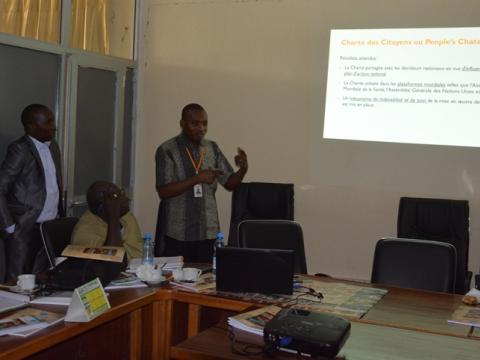World Vision presents People’s Charter at Mali National Assembly

World Vision presented People’s Charter at Mali National Assembly in front of Parliamentarians of the ‘‘Réseau des Parlementaires pour la Lutte contre la Malnutrition (Parliamentarians Network against Malnutrition), representatives of USAID, WFP, UNICEF, Ministry of Health, Save the Children, Scaling Up Nutrition, and many other Civil Society Organisations.
The aim of the encounter was to facilitate parliamentarians better understand of the approach and embark them on the process to ensure that the citizens’ will and needs are represented in the National Action Plans. The role of Parliamentarians in the local and national development process is prominent and their influence to facilitate behaviour change and communities consciousness on several issues is huge. By involving them in this process, World Vision wants to establish a high level of government influence through the parliament lobbying and control roles.
In November 2015, World Vision launched the People’s Charter in Mali and today 60 community consultations have been conducted in 12 municipalities while the regional and sub regional (at Circle level) consultations will begin from May 24th.
The People’s Charter aims to inform the public, including children and youth, about the Global Goals, discuss the goals with them and gather their recommendations and priorities for how the goals are to be implemented in their country through consultations at community level. The People’s Charter serves as a tool for action to ask the government to be accountable for their commitments.
The process also includes a situation analysis that World Vision conducted in order to assess the environment, to understand how the government intends to implement the Global Goals and who is responsible, to know how World Vision can influence stakeholders over the Global Goals, and to also know how the Global Goals will be funded, among other things.
As such, the following departments and agencies of government were met: the Ministry of Environment Sanitation and Sustainable Development, the Department of Multilateral Cooperation of the Ministry of Foreign Affairs, the Ministry of Economy and Finance, the High Council of Territorial Communities, the Ministry of Energy and Water. In addition, several technical and financial partners were met and showed a favourable position in this initiative, including the African Union, the African Development Bank, USAID, ECOWAS, IMF, UNICEF, the embassies Canada and the Netherlands.
World Vision meetings with the different technical and financial partners helped confirmed that the SDGs are within their agenda. This step also facilitated the implementation of various joint community consultations conducted by World Vision and other organisations like Oxfam, GRDR, ACORD, Save the Children…
By the end of June 2016, World Vision Mali would have completed the community, regional and sub regional consultations and will hold a national consultation (round table) whereby all citizens’ priorities and recommendations will be presented in one document to the government with the aim that the document will influence the National Action Plans that will help implement and achieve the Global Goals.
The People’s Charter’s developed by National Offices will be collated into a global document and used by World Vision International for global level advocacy in global platforms like the World Health Assembly and the United Nations General Assembly (Post-2015 engagement).
In line with this advocacy strategy, World Vision Mali and a member from a community will joint other countries, organisations and people from May 23rd in Geneva, at the World Health Assembly, to share the local experience based on the Citizens Hearings, the Citizen Voice and Action groups and other mechanisms that help to take into account citizens’ needs and priorities for strong and sustainable accountability systems. World Vision will bring Malian citizen’s voices to the World Health Assembly.